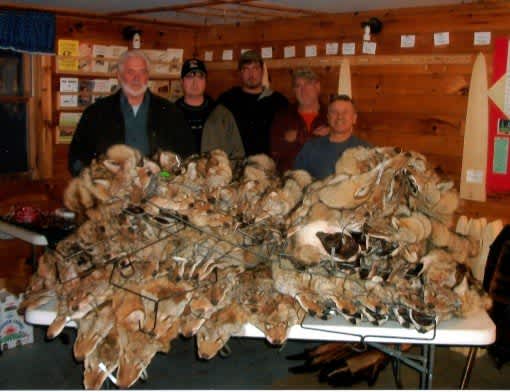One Group of Maine Trappers Catches 83 Coyotes
Skinny Moose 01.16.12

Last year about this time five members of the Carrabassett Valley Trappers reported in an article that the five had trapped and tagged 70 some coyotes. They had taken the coyotes in the early canine season in late October of 2010. This effort helped to reduce damage to livestock and wildlife (deer in particular).
This last year’s (2011) take during the same time frame resulted in the five individuals tagging 83. The period trapped is the special canine season that runs two weeks before the general trapping season and deer hunting season. The five trappers in the photograph are left to right Dave Miller, Gordon Blauvelt, Matt Landry, Steve Rankin, and Jerry LeBeau.
With approximately 2000 licensed trappers in the state, if each caught just 5 apiece, the benefits to our deer herd would be tremendous. With the current condition of the deer herds in western, northern, and down east Maine recovery is about impossible with the current level of predators. These predators that prey on deer size mammals include bears, bobcats, and coyotes; with coyotes being the most prevalent and damaging. At present, the deer numbers are so low that with the level of current predation deer recovery is impossible. This is because the number born and surviving to adulthood is less than that taken annually by the predators.
Trappers, hounds men, and hunters together with effort can reduce the predation by coyotes to a level where recovery is possible along with proper deer wintering area management and the lack of back to back bad winters. The loss of our deer herd has resulted in a tremendous impact to our states economy and in particular that of rural Maine. Deer hunting alone was a multi-million dollar business to the state. In recent years we have seen a great reduction in the number of out of state hunters. The majority of those same hunters (at their own admission) now go to New York, Pennsylvania and other destinations to hunt. They say, why hunt in Maine when there are so few or in some areas no deer anymore.

